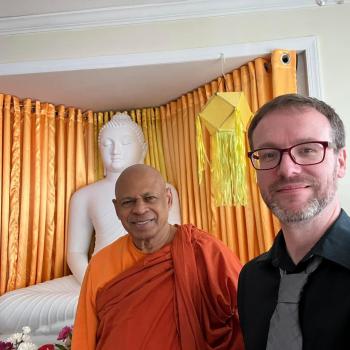“Each moment of cultivating the psychological gesture of kindness rather than the impulse of abandonment is learning to inhabit our life in a fearless way.” -Christina Feldman
Kindness is fundamental to living an ethical life, with positive thoughts, words, and actions. It’s hard to imagine living a life of virtue that isn’t predominately focused on kindness. I’m using the word ‘kindness’ because that’s easier to use and understand, but what we’re really talking about is ‘Metta’. Sometimes this word is translated as kindness and sometimes it’s translated as friendliness. Sometimes it’s also translated as ‘loving-kindness’ and that term feels sort of clunky to me, I guess because it’s a double word and I’m fascinated by language, translation, and how all that comes about.
But we’re not talking about simply being nice, although that is a good thing. We’re talking about making kindness a space where our thoughts dwell. The Buddha talked about a way of being in the world, regardless of what’s going on around you, with a mind that abides in kindness. He wasn’t talking about just holding an umbrella for someone in the rain. He was talking about cultivating a boundless kindness, a sense of kindness that knows no limits. That’s what we’re talking about when we talk about training in kindness.
Metta is also a verb with connotations of ‘befriending’. I like to say we’re trying to make friends with our minds. Sometimes your mind really seems like it’s not your friend. It can seem like your mind isn’t on your side at all. In her book “Boundless Heart” Christina Feldman says, “We learn to befriend ourselves, all of the people who come into our lives, the difficult and the lovely. We learn to befriend all events and circumstances – the challenging and the lovely.” That’s what we’re talking about.
Why would we want to train in kindness?
Bringing more metta into your life will improve your relationships. There’s this conventional wisdom going around that being nice is not really cool. There are even pejorative terms that are completely dedicated to just saying “you care about other people too much and that makes you weak.” I’m talking about terms like ‘bleeding heart’ and ‘snowflake’.
But the truth is if you’re kind to the people around you, they like that. Kindness strengthens bonding and brings people together. If you care about the well being of the people around you and you’re not faking it they can really tell. And they like it. People love it when someone pays attention to them, listens to their concerns, and acts like they matter.
But there is more than that. Our ordinary self centered way of being in the world doesn’t serve us very well. We are carried around by greed, confusion, and aversion. These things get in our way. They stop us from appreciating the good things in our lives and place our attention anywhere but where we are. This makes us distracted and easily manipulated.
Aversion is when we really want to get away from something or we really don’t like our experience. It’s our great resistance to accepting the circumstances we find ourselves. It’s our obsessive thinking about how life is being unfair to us. It steals the joy from our hearts and our lives and leads us to make enemies out of everything all the time. Christina Feldman says, “Aversion propels us into agitated behavior as we try to ‘fix’ or rid ourselves of the people, events, and conditions we are convinced are the source of our unhappiness… The underlying narrative in aversion is about nonacceptance, the eternal story that I and the world need to be different than they are if I am to be happy.”
Aversion is that feeling that leads us to put up walls. It leads us to be suspicious of others. If we’re dwelling in aversion then we can feel like the world is an awful place full of almost exclusively people that want to cause us harm / take things from us or stupid people. This leads us to self isolate. We have to figure out how to avoid those people that are everywhere. If we are caught up in aversion, then we think the world is a terrible place, but that’s also not limited to the world out there. When we’re caught up in aversion we think we’re terrible too. Maybe we think we’re unworthy of happiness. That’s not a happy way to live your life. But aversion is powerful. Managing it is something we have to be determined to do. We are going against the tide of emotional baggage that we’ve been carrying around all of our lives if we want to learn to resist aversion.
What we’re really doing here is sort of like planting seeds. We’re going through a process to set an intention to not be carried around by aversion. We can change our thinking. We can stop making enemies out of everything all the time. Every moment we set that intention to dwell in kindness instead of aversion matters. We are committing to changing how we see things and to living with an open heart.
We are often so obsessed with our aversion, our fear, and our emotional baggage. This leads us to feeling shame or otherwise condemning ourselves. Aversion can easily establish a narrative that separates us from others. It can be isolating. When you’re really acting out of kindness, there is much less narrative.
Kindness doesn’t create enemies out of anything. We aren’t called to love everyone necessarily, but to grant some level of respect and tolerance. Metta is about happiness and peace rooted in understanding. This is a training of our hearts and a commitment to be more intentional in our behavior. In many of the choices we make we can choose to ask ourselves, “Does this lead me toward or away from an open heart?”
We don’t have to always feel like being kind in order to respond to what’s happening with kindness. I think we get caught up with thinking that we shouldn’t be kind if we don’t feel like it. I want to challenge you to not think in that way. Being kind isn’t just something we’re doing for others because we feel like it. It’s a commitment to making our lives better. Kindness leads to happiness. Being nice to other people is a natural part of who we are. We are challenging ourselves to think in terms of ‘we’ and ‘us’ instead of thinking ‘I-Me-Mine’ all the time.
That is what this is all about.
If you want to take a class I’m teaching online with the Rime Center about living with a Boundless Heart, click here:
Boundless Heart Class – Online
here’s a guided metta meditation:
Boundless Heart Guided Meditation
and here’s another one with a talk on the subject included:
Boundless Heart talk + meditation
if you are interested in Christina Feldman’s book “Boundless Heart” you can get it here. Highly recommend.












